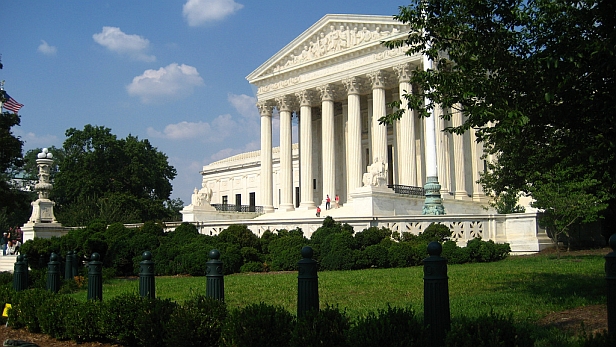 Courtesy Kyle Rush via FlickrFederal-court watcher Glenn Sugameli suggests two ways President Obama’s next Supreme Court nominee can help make the court more ecologically intelligent.
Courtesy Kyle Rush via FlickrFederal-court watcher Glenn Sugameli suggests two ways President Obama’s next Supreme Court nominee can help make the court more ecologically intelligent.
Nine years ago Sugameli founded Judging the Environment, a clearinghouse for info on how federal judges (who get lifetime appointments) determine environmental policy. He’s also a staff attorney at Defenders of Wildlife, formerly of Earthjustice, which often leads green groups in major cases.
Sugameli takes issue with the notion that “diversity” on the court means only ethnic and religious diversity. Diversity of life experience should be just as important, he said in an interview. That might hold true for understanding diversity in any context, but Sugameli says it’s especially important in cases that involve people living near mines, smokestacks, and other industrial hazards.
“Sometimes the judges just do not understand what’s at stake, do not understand the science, and do not understand the real-world impact,” he said, referring to cases he’s argued in the D.C. Circuit U.S. Court of Appeals. “Because of that, they’ll misinterpret what Congress intended. They don’t really understand why statutes were passed.”
He referred to a Surface Mining Control and Reclamation Act case involving coal mines that were allegedly causing homes to collapse. “Despite the fact that we talked about [the collapses] during the entire argument, at the very end one of the D.C. circuit judges said, ‘This statute is all about excess dust, right?'”
The experience question is timely, since all current justices were formerly federal appeals judges. Two of Obama’s likely picks (Diane Wood and Merrick Garland) are appeals judges, while the third reported frontrunner, Elena Kagan, is not. (More on their environmental records.)
Sugameli stopped short of endorsing a nominee, though he praised a Politico op-ed that argues Obama should pick someone with political experience, such as Sen. Sheldon Whitehouse (D-R.I.), a former U.S. attorney and state attorney general. (Arguments for putting a politician on the court have been making the rounds.)
Sugameli also suggested that getting the “most liberal” nominee matters less than finding a good collaborator. In other words, a lone ranger would be less effective than someone with the ability to persuade other justices.
“I think there’s a need for somebody who will not only vote the right way, but who will understand these issues and help others understand them and move the court, which can make the enormous difference.” he said.
Senator Charles Schumer (D-N.Y.) made a similar point last week: “I’d like the new nominee to be one of five, not one of four, when the votes come up, and somebody who would be quite persuasive in terms of influencing other justices, I guess particularly Justice Kennedy, to his or her point of view. And that would matter to me more than any particular ideology.”
To Sugameli, those considerations matter more than a nominees’ score on a liberal-conservative scale.



